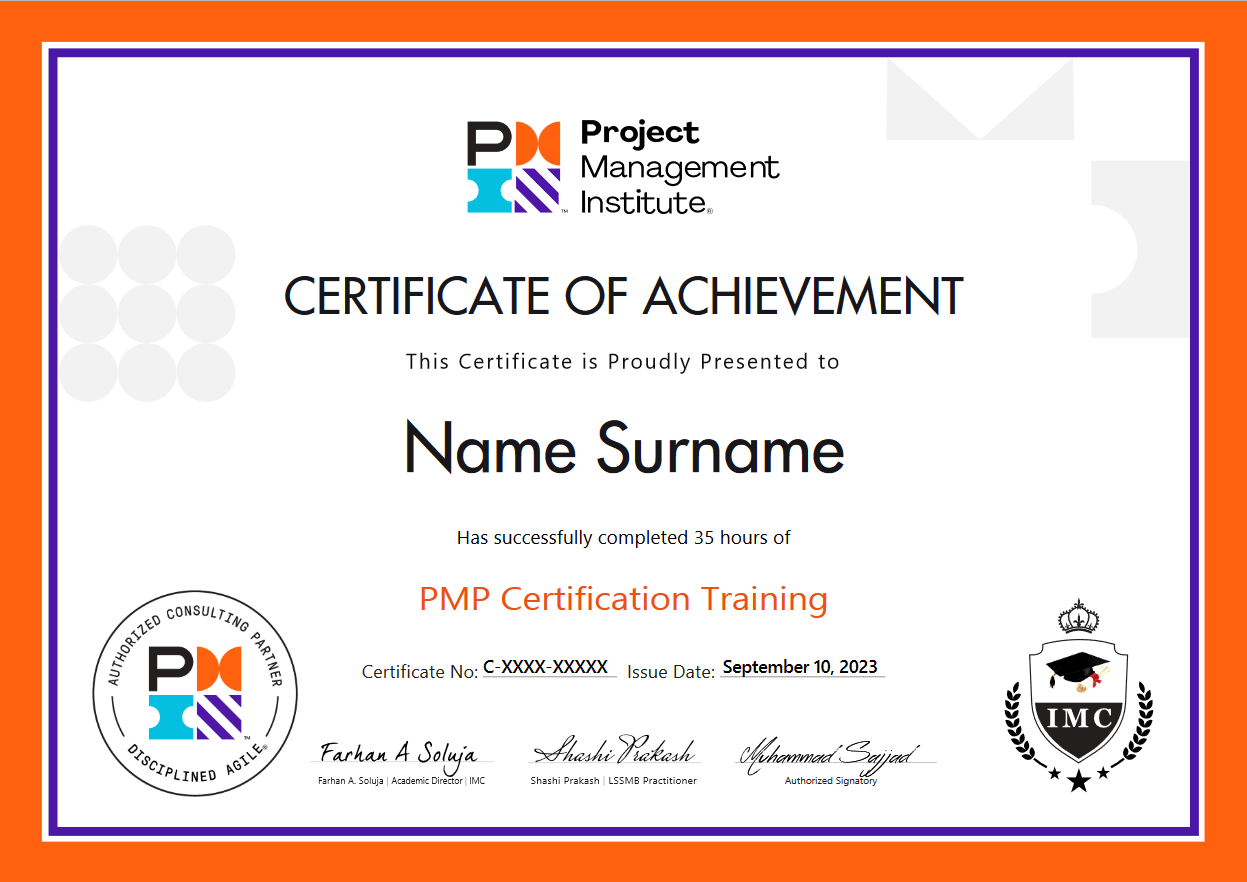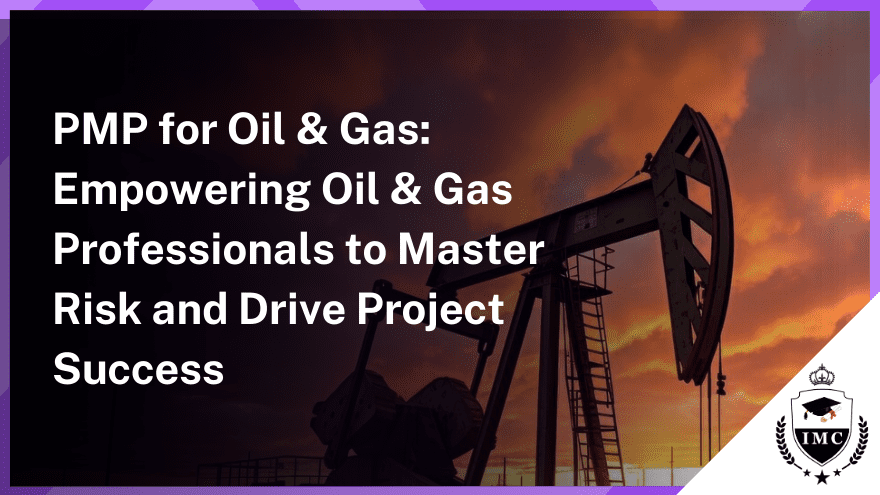The oil and gas industry is a complex and dynamic sector characterized by large-scale projects, ever-evolving regulations, and inherent risks. Successfully navigating this landscape requires a skilled and qualified workforce, particularly in the crucial domain of project management. This is where the Project Management Professional (PMP) certification comes into play. Earning a PMP certification demonstrates an individual's proficiency in the globally recognized Project Management Institute (PMI) framework, equipping them with the essential tools and knowledge to effectively manage projects across various industries, including the intricacies of oil and gas ventures.
At IMC Institute, we recognize the significance of risk management in the oil and gas industry and offer a comprehensive PMP certification training program designed to empower professionals with the knowledge and skills necessary to excel in this challenging domain. With experienced instructors and a comprehensive curriculum, we equip project managers to become risk management experts, ensuring the successful execution of even the most complex oil and gas projects.
Understanding the Complexities of Oil and Gas Projects
Oil and gas projects are inherently complex, involving a multitude of stakeholders, stringent regulations, and intricate operational processes. These projects often take place in remote and challenging environments, further compounding the risks associated with them. From environmental concerns and safety hazards to geopolitical tensions and supply chain disruptions, the risks are multifaceted and ever-present.
The Value of PMP Certification in Risk Management
The PMP certification, offered by the Project Management Institute (PMI), equips project managers with the knowledge and skills necessary to navigate the intricate world of risk management effectively. By adhering to the proven methodologies and best practices outlined in the Project Management Body of Knowledge (PMBOK® Guide), PMP-certified professionals are better equipped to identify, assess, and mitigate risks throughout the project lifecycle.
Comprehensive Risk Identification and Analysis: PMP-certified project managers possess the expertise to identify potential risks proactively, leveraging techniques such as risk breakdown structures, risk data quality assessments, and risk categorization. This comprehensive approach ensures that no stone is left unturned, enabling effective risk mitigation strategies.
Quantitative and Qualitative Risk Analysis: The PMP certification emphasizes the importance of both quantitative and qualitative risk analysis methods. PMP-certified professionals can employ tools like Monte Carlo simulations, decision tree analysis, and expert judgment to accurately assess the likelihood and impact of risks, enabling informed decision-making.
Risk Response Planning: Once risks have been identified and analyzed, PMP-certified project managers are skilled in developing robust risk response plans. These plans encompass strategies such as risk avoidance, mitigation, transfer, or acceptance, ensuring that appropriate actions are taken to minimize the impact of risks on project objectives.
Risk Monitoring and Control: Throughout the project lifecycle, PMP-certified professionals continuously monitor and control risks, employing techniques such as risk audits, risk reassessments, and risk response control. This proactive approach ensures that risks are effectively managed and mitigated as they emerge or evolve.
Why is the PMP certification crucial for risk management in oil and gas projects?
Here are some key reasons:
Structured Approach: The PMI framework provides a structured approach to project management, emphasizing processes like risk identification, assessment, planning, and mitigation. This structured approach ensures a systematic and comprehensive evaluation of potential risks, allowing project managers to proactively address them before they escalate.
Enhanced Risk Management Skills: PMP training equips individuals with a specific set of skills and tools crucial for effective risk management. These include risk identification techniques, qualitative and quantitative risk analysis, risk mitigation strategies, and contingency planning. By mastering these skills, project managers can make informed decisions about potential risks, minimizing their impact on project success.
Improved Communication and Collaboration: Effective communication and collaboration are essential for successful risk management in complex projects like those found in the oil and gas industry. The PMP framework emphasizes the importance of clear communication and collaboration among stakeholders, fostering a team environment where risks are openly discussed, and solutions are collaboratively developed.
Global Recognition: The PMP certification is a globally recognized credential, demonstrating an individual's commitment to professionalism and adherence to best practices in project management. This recognition holds significant weight within the oil and gas industry, where projects often involve international teams and collaborations.
Certification
On successful completion of the course and course requisites, the candidate will receive the certificate of PMP Certification Training.

Benefits of a PMP certification for professionals in the oil and gas industry:
Increased Earning Potential: Studies have shown that PMP certified individuals generally command higher salaries compared to their non-certified counterparts. This is particularly true within the oil and gas industry, where skilled project managers are highly sought after.
Career Advancement Opportunities: Earning a PMP certification demonstrates an individual's dedication to professional development and their commitment to excellence in project management. This can significantly enhance career advancement opportunities within the oil and gas sector, opening doors to leadership positions and project management roles with greater responsibility.
Improved Project Success Rates: By applying the knowledge and skills gained through PMP training, project managers can contribute to improved project success rates in the oil and gas industry. This translates to better cost control, schedule adherence, and overall project delivery efficiency.
Summary
The oil and gas industry is characterized by complex projects that involve a multitude of stakeholders, stringent regulations, and intricate operational processes. These projects often take place in remote and challenging environments, further compounding the risks associated with them. From environmental concerns and safety hazards to geopolitical tensions and supply chain disruptions, the risks are multifaceted and ever-present.
The PMP certification equips project managers with the knowledge and skills necessary to navigate the intricate world of risk management effectively. PMP-certified professionals are better equipped to identify, assess, and mitigate risks through comprehensive risk identification and analysis, quantitative and qualitative risk analysis methods, robust risk response planning, and continuous risk monitoring and control. Effective risk management is crucial for the success of oil and gas projects, as the consequences of mismanaged risks can be catastrophic, including environmental disasters, financial losses, reputational damage, and compromised safety. By embracing the best practices outlined in the PMP certification, project managers can navigate the complexities of these projects with confidence, minimizing risks and maximizing the chances of successful project delivery.






